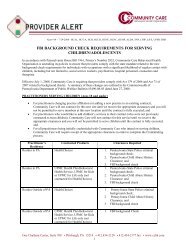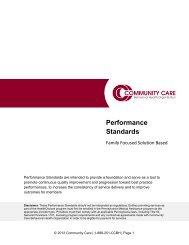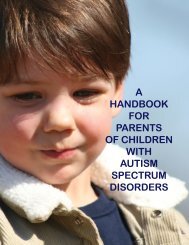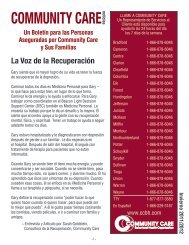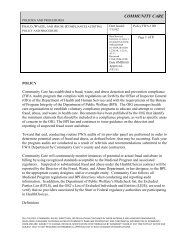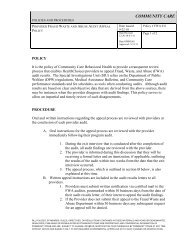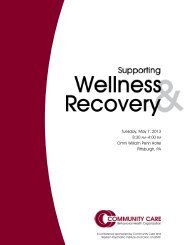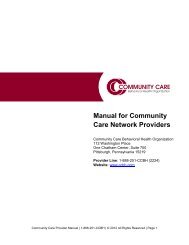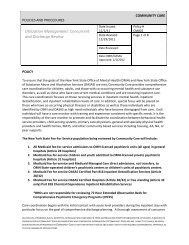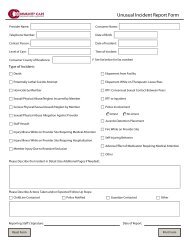a handbook for parents of children with autism spectrum disorders
a handbook for parents of children with autism spectrum disorders
a handbook for parents of children with autism spectrum disorders
You also want an ePaper? Increase the reach of your titles
YUMPU automatically turns print PDFs into web optimized ePapers that Google loves.
ANSWERS TO YOUR QUESTIONS<br />
What does a recommendation <strong>for</strong> BHRS look like and what does it<br />
mean?<br />
Following the evaluation, the evaluator will summarize his or her findings and<br />
make specific recommendations that include a prescription <strong>for</strong> services. These<br />
services are requested in “hours per week.” For example, a prescription might<br />
state “recommend 3 BSC hours per week and 10 TSS hours per week in the<br />
home to address John’s <strong>of</strong>f-task behavior and self-stimulatory behaviors.”<br />
This means that the evaluator is requesting 3 Behavioral Specialist Consultant<br />
hours per week and 10 Therapeutic Staff Support hours per week.<br />
People <strong>with</strong> Autism<br />
who have an<br />
extraordinary talent<br />
are referred to as<br />
“autistic savants.”<br />
Savants are rare.<br />
Savant ability is<br />
more frequently<br />
associated <strong>with</strong><br />
those having some<br />
<strong>for</strong>m <strong>of</strong> Autism rather<br />
than <strong>with</strong> other<br />
disabilities. Current<br />
thinking holds that at<br />
most, 1 or 2 in 200<br />
individuals <strong>with</strong> an<br />
Autistic Spectrum<br />
Disorder might have<br />
a genuine savant<br />
talent.<br />
These services will be provided over a period <strong>of</strong> time. Four months is the<br />
typical amount <strong>of</strong> time covered in a prescription period. However, evaluators<br />
are also able to recommend up to a 1-year period <strong>for</strong> these services<br />
depending on your child’s circumstances. These hours are provided per week<br />
and cannot be carried over from week to week if not utilized.<br />
What happens following the evaluation?<br />
The facility that did the evaluation will hold a treatment team meeting <strong>with</strong> you<br />
(commonly known as the Interagency Service Planning Team, or ISPT). The<br />
<strong>children</strong>’s intake staff at the agency will begin to identify a provider to accept<br />
your child’s case if it is authorized.<br />
What is an ISPT?<br />
An ISPT (Interagency Service Planning Team) meeting usually consists <strong>of</strong><br />
the service providers, family members, school personnel, a care manager<br />
from Community Care Behavioral Health Organization (Community Care; a<br />
managed care organization), and/or others invited to participate. During this<br />
meeting, the child’s needs are discussed, along <strong>with</strong> the impact <strong>of</strong> services,<br />
need <strong>for</strong> changes in services, and/or other recommendations. The team may<br />
discuss the evaluator’s recommendations. If the team members are not in<br />
agreement, they can request that the evaluator change his or her original<br />
recommendations.<br />
What happens after the meeting?<br />
Following the evaluation and ISPT meeting, the evaluation, treatment plan,<br />
and related meeting documents will be sent to Community Care to review <strong>for</strong><br />
authorization. Community Care manages behavioral health services.<br />
- Page 18 -



